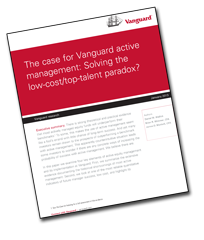Two seasoned investment pros argue the case for and against actively managed funds versus passive index funds.
In a surprising twist, Vanguard principal Daniel Wallick presents the active management case while award-winning financial advisor Gregg Fisher defends the passive approach.
WEALTHTRACK Episode #952; Originally Broadcast on June 21, 2013
Listen to the audio only version here:
Daniel Wallick & Gregg Fisher
Explore This Episode
We have compiled additional information and content related to this episode.
[wptabs mode=”horizontal”]
[wptabtitle]Guest Info[/wptabtitle]
[wptabcontent]
Principal, Vanguard Investment Strategy Group
GREGG FISHER
Chief Investment Officer, Gerstein Fisher
[/wptabcontent]
[wptabtitle] Newsletter[/wptabtitle]
[wptabcontent] A global market rout! This was not what Federal Reserve Chairman Ben Bernanke intended in his policy of transparency about Fed policy. Just the whiff of the Fed “tapering” its record breaking, government bond buying stimulus program was enough to set off alarm bells around the globe. Stocks, bonds, commodities and foreign currencies have plummeted. According to Bloomberg, yields on the 10-year Treasury note climbed to a 22 month high of 2.47% at one point today, after a big jump yesterday. That means that holders of longer maturity Treasury bonds are losing money.
A global market rout! This was not what Federal Reserve Chairman Ben Bernanke intended in his policy of transparency about Fed policy. Just the whiff of the Fed “tapering” its record breaking, government bond buying stimulus program was enough to set off alarm bells around the globe. Stocks, bonds, commodities and foreign currencies have plummeted. According to Bloomberg, yields on the 10-year Treasury note climbed to a 22 month high of 2.47% at one point today, after a big jump yesterday. That means that holders of longer maturity Treasury bonds are losing money.
I called Loomis Sayles Bond Fund legend Dan Fuss this afternoon to get his read on the market. Of course, Fuss revels in these opportunities. Calling it a buyer’s market, he and his team are “incrementally” buying some higher quality, high-yield bonds. As he said, this is the first time in months that high-yield was attractive enough to buy. He is also looking at emerging market debt, particularly bonds trading in local currencies, which have gotten hammered. But as Fuss also said, this is a “dangerous” market and it’s a very different market than it has been in the past. There is a much larger retail presence through open-ended mutual funds and ETFs, and individuals have hit the sell button. And because of the financial crisis and the changes traditional brokerage firms and banks have had to make in their business, they are a much smaller presence in the market. Financial institutions cannot put as much capital at risk these days. They are also smaller, so the arbitrage strategies they would traditionally use in markets such as these, where the firms would buy some bonds are not being used. The result is few buyers are stepping up and bond sellers are at the mercy of those who do. That’s positive for pros like Fuss.
Another interesting point that Fuss made was that the market can also cause events, not just react to them. The market sell off could create a negative feedback loop and slow the economy down, in which case the Fed’s more optimistic forecasts could go out the window and the safe haven assets, such as Treasury securities, could rally again. He recommended I listen to an interview Bill Gross did on Bloomberg talking about the Fed’s focus on data and how important that data will be in determining Fed policy. I did- he was correct, which is why I am sharing it with you.
This week we are focusing on a debate raging among investors around the world: the active versus passive debate. What percentage of your investments are in actively managed funds? What portion are in passive index funds or ETFs? If you are like most investors, the mix is pretty one sided. According to Vanguard, 74% of assets under management in domestic and international stock mutual funds are actively managed and only 26% are in passive funds, although that number is growing.
But here’s the rub. The number of actively managed funds outperforming their market benchmarks has actually been declining over time. A disappointing 24% did so over the past ten and fifteen years, only 23% did over the past 20 years, and a paltry 18% did over the last quarter century. Why have active managers done so poorly versus their market benchmarks over the years? How do you find an actively managed fund that will be in that top 25% over time? Would you be better off investing in passive index funds, or ETFs? Can you combine them in your portfolios as many of us have done and if so how do you decide the mix? These are all questions we will discuss with this week’s WEALTHTRACK guests.
Daniel Wallick is Principal in Vanguard’s Investment Strategy Group, where he is responsible for developing portfolio strategies. He is co-author of the fascinating report titled: “The Case For Vanguard Active Management: Solving The Low Cost/Top Talent Paradox?” Surprisingly, Vanguard is the 4th largest active equity manager in the U.S. with over $225 billion in actively managed stock funds.
Gregg Fisher is the Chief Investment Officer of Gerstein Fisher, an independent investment management and advisory firm that he founded in 1993. Gerstein Fisher was named to Barron’s list of top 100 financial advisors this year as well as in 2012 and its list of top 100 independent advisors in 2011. In 2009, Fisher founded the Gerstein Fisher Research Center which partners with leading academics in finance, risk engineering, and economics to study and improve the investment process. I’ll begin the interview with this question: given the poor performance of most active stock managers why should we even bother investing with them? They have some interesting answers!
Have a great weekend and make the week ahead a profitable and a productive one!
Best regards,
Consuelo
 [/wptabcontent]
[/wptabcontent]
[wptabtitle]Action Point[/wptabtitle]
[wptabcontent][post-content id=6327 content=yes][/wptabcontent]
[wptabtitle]One Investment[/wptabtitle]
[wptabcontent]WALLICK: LOW COST GLOBAL
Own a low-cost, globally diversified stock portfolio
“I would be as diversified as you are comfortable. Now, there may be liability reasons why you might want to have a home country bias, but I think thinking about sort of global equity in that form on a low-cost basis is really a great starting point for long-term investors.”
– Daniel Wallick
FISHER: GLOBAL REAL ESTATE
Commercial real estate
“We think global real estate. Actually what we find is most investors have a very small percentage of their portfolio in commercial real estate, particularly for U.S. investors, commercial real estate outside of the United States, and from a diversification perspective, when we look at what most traditional investors have, we see this as an asset class that has a lot of potential, some merits around the potential for inflation, and it’s generally something that investors have a small amount of exposure to that they would, I think, be well served by adding to their portfolio.”
– Gregg Fisher
[/wptabcontent]
[wptabtitle]Transcript[/wptabtitle]
[wptabcontent]This transcript is available to WEALTHTRACK Premium subscribers here. Alternately, you can purchase and download this transcript safely and securely with your credit card or PayPal account for $4.99. You will need the free Adobe Acrobat Reader (Mac/Win) or Preview (Mac) to view and print the transcript.[/wptabcontent]
[wptabtitle]Bookshelf[/wptabtitle]
[wptabcontent]No books available.[/wptabcontent]
[wptabtitle]Purchase DVD[/wptabtitle]
[wptabcontent]Please check back for availability.[/wptabcontent]
[wptabtitle]Archive[/wptabtitle]
[wptabcontent]There are no archive episodes for these/this guest(s).[/wptabcontent]
[/wptabs]
 Download: The case for Vanguard active management: Solving the low-cost/top-talent paradox? [pdf]
Download: The case for Vanguard active management: Solving the low-cost/top-talent paradox? [pdf]



